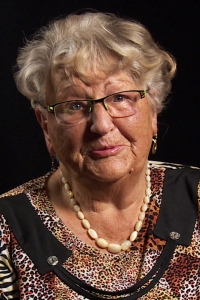We came as refugees and we’ve been refugees ever since

Download image
Ilse Weitz was born on 17 December 1935 in Brno. She also attended primary school there. Her mother worked as a seamstress, her father, a tram driver, was killed in 1944 at the battlefront. After the liberation in 1945, she was forced to walk the Brno Death March, together with her grandmother, younger sister and mother. After the expulsion, the family followed relatives to Krems in Austria, where her mother tried to support her two daughters and her mother by sewing. The journey from Brno to Krems took a total of 19 days. Before that, during their forced stay in a camp in Pohořelice, Ilse Weitz fell ill with dysentery, but she had to march anyways. In 1947, the family moved from Krems to Geras, where they remained for the next eighteen years. In Geras, Ilse Weitz finished school and from the 1950s she worked as a post office operator. In 1965 she moved to Sankt Pölten, where she worked as postmaster until her retirement. After 1989 she visited her native Brno several times. Today (2020) she lives in Sankt Pölten.

